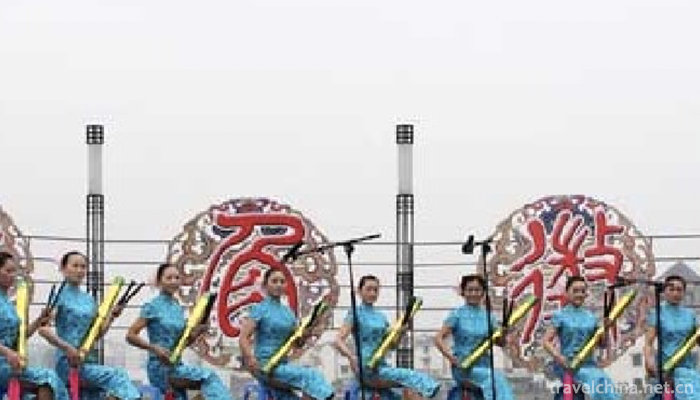chanting of folk tales to the accompaniment of bamboo percussion instruments
Yugu Daoqing, also known as Bangbangqiangzi, is a kind of Han opera in Anhui Province. Beating fishing drums accompanied by singing has become a performance form of fishing drum sentiment. Fishing drums have been popular since the late Qing Dynasty and have a history of more than 100 years. Its form is to use three feet three inches long bamboo tube, covered with pig's guard leather, with wooden wooden board to beat and make rounding rap. One Person sings accompaniment, right hand beats fishing drum, left hand beats bamboo board as accompaniment. Popular in China's civil society, as a kind of Han rap art which advocates Taoism, is the way of Taoism to help the world and to spread Taoist doctrine.
brief introduction
Yugu Daoqing, also known as Bangbangqiangzi, is a kind of Han opera in Anhui Province. Beating fishing drums accompanied by singing has become a performance form of fishing drum sentiment. Fishing drums have been popular since the late Qing Dynasty and have a history of more than 100 years. Its form is to use three feet three inches long bamboo tube, covered with pig's guard leather, with wooden wooden board to beat and make rounding rap. One Person sings accompaniment, right hand beats fishing drum, left hand beats bamboo board as accompaniment. Popular in China's civil society, as a kind of Han rap art which advocates Taoism, is the way of Taoism to help the world and to spread Taoist doctrine.
Singing Form
Fishing drum is an art form for fishermen to enjoy themselves. The main form of rap is group sitting and singing. There are also singers and double singers. Music rhythm changes very flexibly, 4/4, 3/4 of the rhythm appears alternately, music is extremely unique. Its slab style includes "slow slab", "flat slab", "number slab", "three-pull-out", "rhyme", "plain white", "introduction to the stage" and "poem on the stage".
Historical Origin
"Tao Qing" is a special opera of Taikang, which originated from the song of Taoism in the late Ming and early Qing Dynasties. It was called "Yu Gu Dao Qing" in ancient times because Taoist priests sang music accompanied by fishing drums. It spread in northern Anhui in the Ming and Qing Dynasties, and formed the art of music and singing after the amalgamation of the Han folk minor "Ying Ge Liu" in Fuyang area of Anhui Province. Later Qing Dynasty (1860) It was introduced to Xihua, Qixian and Taikang from Shenqiu and Dancheng.
Taoist sentiment is popular in Chinese civil society. As a kind of Han rap art, it is a way of Taoism to help the world and spread Taoist doctrine. Based on the detailed investigation of the relevant materials in historical books and Taoist scriptures, this paper holds that Taoist sentiment had been created as early as the Five Dynasties, and Taoist priests sang Taoist sentiment in order to propagate Taoism. Taoist art is the product of Taoist folk culture. Taoist works by Taoists and literati in Song, Yuan, Ming and Qing dynasties reflect the influence of Taoism on Chinese popular literature and the dominant position of Taoism in Chinese Han belief system.
The fishing drum is a form of plate and chamber quyi. It originated from the late Qianlong period of the Qing Dynasty. It was taught by a fishing drum artist who lived in a salt depression area due to famine. After that, he constantly absorbed the nutrition and essence of local folk songs, and gradually developed into a fast-paced, tunic and comfortable local flavor. Special music is one of 26 kinds of music in China.
In 2011, it was selected as the third batch of national intangible cultural heritage list.
Inheritance Significance
Yugudao opera is rich in repertoire, close to the people, rich in local flavor, is an ancient and rare opera. It is urgent to inherit and carry forward.

0 Questions
Ask a Question
Your email address will not be published.